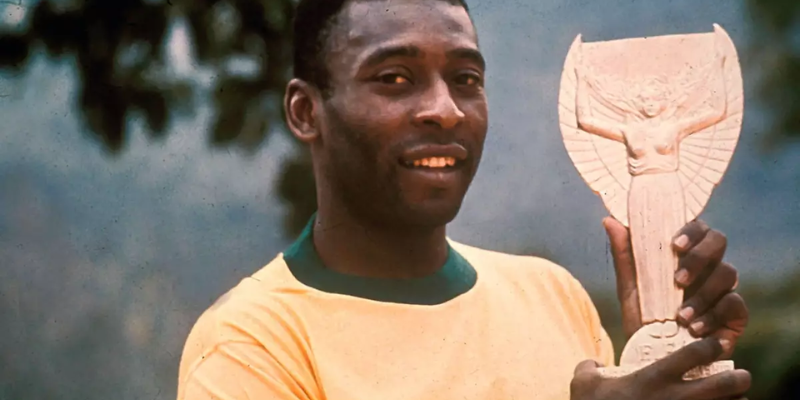In this article, FreeKickSEO will take you deep into the story behind why nickname Pele stuck to Edson Arantes do Nascimento—one of the greatest footballers in history.
Early life and origin of the name “Peson’s” name
Before “Pele,” he was born Edson Arantes do Nascimento on October 23, 1940, in Três Corações, Minas Gerais, Brazil. His parents named him after the American inventor Thomas Edison. However, in Brazil the spelling lost the “i,” so he was known as Edson, though many records later mis-spelled it “Edison.”
Within his family, he was given the nickname “Dico.” That was his childhood name, long before the name Pelé came into being.
Two kids’ tales: mispronouncing Bilé & nickname fights

There are several overlapping stories about why nickname Pele arose—none have been definitively confirmed, even by Pele himself. Here are the most credible:
- Mispronouncing Bilé
- When he was a schoolboy, Edson admired a local goalkeeper named Bilé. Supposedly, Edson tried to say “Bilé” but mispronounced it—something like “Pele” came out instead. The friends teased him with it, and the name hung on.
- Friends gave him the name; he didn’t like it, his friends began calling him Pelé as a form of friendly mockery. At school, he even got upset—so upset that he and a friend got in a fight over it, leading to suspension. The name bothered him early on, but eventually it was accepted and became his identity.
Meaning and uncertainty
- Pelé himself, later in life, admitted he didn’t know what “Pelé” means. He asked old friends, searched, and found that it doesn’t have a meaning in Portuguese or any clear linguistic origin. It’s just the nameit stuck.
“O Rei” and how Pelé became more than a name

Once Pelé began shining on the field, why nickname Pele shifted. Some key steps in that transformation:
- After his first World Cup win in 1958 at age 17, Brazilians—and then the world—started calling him “O Rei” (The King), reflecting his dominance.
- His goal-scoring records, dribbling, creativity, and charisma all reinforced that the name Pelé was more than a label—it was an identity. A name that came.
Common misconceptions about Pelé’s nickname
When people search why nickname Pele, they often stumble onto myths. These are some of the most circulated but likely inaccurate ideas:
- Candomblé or spiritual origin: Some claim Pelé came from an Afro-Brazilian spiritual tradition or Candomblé. There’s no strong evidence supporting this. The mispronunciation + school nickname story is far more commonly accepted.
- Official meaning in Portuguese: People often search if “Pelé” means something like “miracle” or “lightning.” It doesn’t—it has no known meaning. Pelé himself said as much.
The power of a nickname: legacy and symbolism

Understanding why nickname Pele matters because it shows how identity in sports can form:
- The name became symbolic of excellence, breakthrough, and global reach in football.
- It shows how a nickname—even one someone resists—can become inseparable.
- Wherever people say “Pelé,” they immediately think of his records: over 1,000 goals including friendlies, three World Cup wins, unmatched influence across continents.
Conclusion
Why nickname Pele resonates goes beyond childhood mispronunciation or schoolyard teasing—it’s a story of how a name, once unwanted, can become legendary. From Edson Arantes do Nascimento being called “Dico,” to gradually becoming known simply as Pelé, his nickname captures both humility and greatness.
If you found this exploration into Pelé’s name interesting, FreeKickSEO invites you to dive deeper: learn more about his early years, his record-breaking stats, or compare other legends’ nicknames. Keep following us for stories behind the history, the stats, and the legends—after all, every name has a story only greatness can tell.






